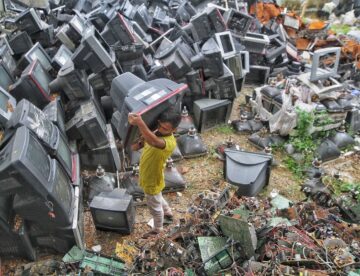In our ever-evolving technological landscape, electronic devices have become indispensable aspects of our daily lives. From smartphones to laptops, tablets to smartwatches, we rely heavily on these gadgets for communication, work, entertainment, and beyond. However, with rapid advancements in technology, there comes a significant downside: electronic waste, or e-waste.
E-waste comprises discarded electronic devices, which pose serious environmental and health risks if not properly disposed of or recycled. The improper handling of e-waste leads to toxic substances leaching into the soil and water, posing hazards to both human and ecological health. Recognizing the urgency of this global issue, several countries have taken proactive measures to tackle e-waste through recycling initiatives.
Here, we highlight the top 10 countries leading the charge in e-waste recycling.
- Switzerland: Renowned for its efficient waste management systems, Switzerland ranks high in e-waste recycling. The country boasts advanced infrastructure and strict regulations that ensure the proper disposal and recycling of electronic devices. With a robust network of collection points and recycling facilities, Switzerland sets a stellar example in managing e-waste responsibly.
- Norway: Norway prioritizes sustainability and environmental conservation, making significant strides in e-waste recycling. The Norwegian government, along with private sector stakeholders, implements comprehensive recycling programs and initiatives to minimize electronic waste. Through public awareness campaigns and convenient recycling options, Norway encourages citizens to recycle their e-waste responsibly.
- Sweden: With its commitment to environmental stewardship, Sweden excels in e-waste management practices. The country emphasizes the circular economy model, focusing on resource efficiency and recycling. Swedish authorities collaborate with industries and communities to establish effective e-waste collection and recycling systems, ensuring minimal environmental impact from electronic waste.
- Denmark: Denmark prioritizes waste reduction and recycling efforts, including e-waste management. The Danish government promotes sustainable practices and invests in innovative recycling technologies to handle electronic waste efficiently. Through comprehensive legislation and public-private partnerships, Denmark continues to enhance its e-waste recycling infrastructure and raise awareness among its populace.
- Germany: Known for its rigorous recycling regulations and initiatives, Germany emerges as a global leader in e-waste recycling. The country implements extended producer responsibility (EPR) schemes, holding manufacturers accountable for the proper disposal and recycling of electronic products. Germany’s well-established recycling infrastructure ensures that a significant portion of e-waste is recycled and repurposed effectively.
- Netherlands: The Netherlands adopts a proactive approach to e-waste management, focusing on waste prevention, reuse, and recycling. Through innovative strategies and collaborative efforts between government agencies, businesses, and consumers, the Netherlands achieves high rates of e-waste recycling. The country’s commitment to sustainability and circular economy principles drives continuous improvement in its recycling infrastructure.
- Belgium: Belgium demonstrates a strong commitment to sustainable waste management practices, including e-waste recycling. The Belgian government implements strict regulations and provides incentives to promote the proper disposal and recycling of electronic devices. Through public awareness campaigns and efficient collection systems, Belgium strives to minimize the environmental impact of e-waste and conserve valuable resources.
- Finland: Finland emphasizes environmental responsibility and innovation in its approach to e-waste recycling. The Finnish government supports research and development efforts aimed at improving recycling technologies and processes. By fostering collaboration between stakeholders and investing in infrastructure, Finland aims to achieve high rates of e-waste recycling and contribute to a circular economy.
- Austria: Austria places a strong emphasis on sustainable waste management practices, including the recycling of electronic devices. The Austrian government implements regulations to ensure the proper handling and recycling of e-waste, holding both manufacturers and consumers accountable. Through efficient collection systems and recycling facilities, Austria maintains a high level of e-waste recycling and resource recovery.
- Japan: As a technologically advanced nation, Japan faces significant challenges in managing its e-waste effectively. However, the Japanese government and industry stakeholders have implemented innovative solutions to address this issue. Japan utilizes advanced recycling technologies to extract valuable materials from electronic devices, minimizing waste and environmental impact. With ongoing efforts to improve recycling infrastructure and raise awareness, Japan remains a key player in e-waste recycling efforts globally.
In conclusion, these top 10 countries exemplify excellence in e-waste recycling through their commitment to sustainability, innovation, and effective waste management practices. By prioritizing the proper disposal and recycling of electronic devices, these nations pave the way for a greener, more sustainable future. However, the fight against e-waste is a collective effort that requires global cooperation and individual responsibility. Through continued collaboration and concerted actions, we can work towards a world where electronic waste is managed responsibly, minimizing its adverse effects on the environment and human health.


